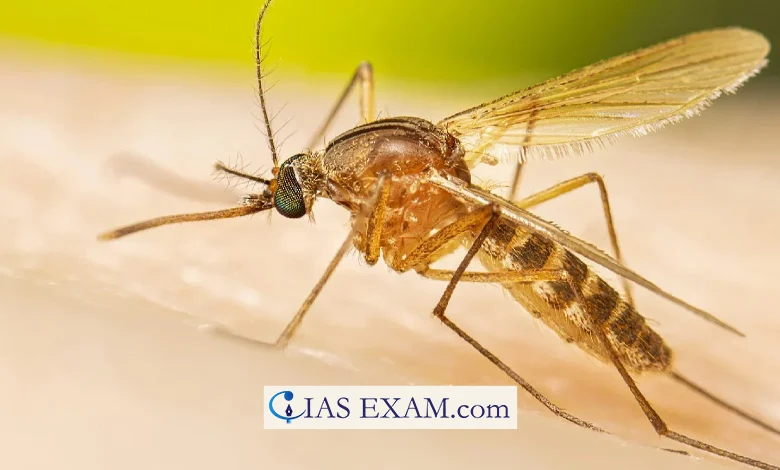
Context
West Nile Fever (WNF) is a viral infection spread by the Culex species of mosquitoes. In Kerala, cases have been reported in the districts of Thrissur, Malappuram, and Kozhikode. The Kerala government has issued an alert and instructed authorities to ramp up pre-monsoon cleaning activities to prevent the spread of the infection.
Key Points
- An outbreak of West Nile fever in Kerala was followed by a health department’s alert after these viral cases were tested positive in three divisions.
- Healthcare professionals have established that mosquitos are the prime means by which the virus is transmitted.
- Preventive measures such as ramping up vector-control activities have been speculated in areas currently under threat.
- In the area, cases of the West Nile virus infection have been reported in the past.
- Now, the health authorities are watching the development of the outbreak very closely because 10 people are infected and not excluded from this list of the infected, there are two suspected deaths associated with the disease.
What is West Nile Fever?
- WNF is a condition that originated from the West Nile Virus. This mineral is widely exploited from the continent of Africa, Europe, the Middle East, North America as well as West Asia.
- Like other viruses, dengue is mainly transmitted through the mosquito-borne infectious process where a mosquito, after feeding on an infected bird, becomes infected and spreads the disease to other humans. Man actually may develop a variety of symptoms, from flu-like conditions, to severe brain problems.
Symptoms of West Nile Fever
- For cases of infections, there are several symptoms that might be experienced. The mild side effect of the disease onset is increasing body temperature, headache, body aches, weakness, nausea, vomiting, diarrhoea and swelling of the lymph nodes.
- In contrast, the morbidity of influenza is manifested by diseases being life-threatening in which possibilities of having conditions such as meningitis, encephalitis, severe headache, high fever, neck stiffness, disorientation, tremors, seizures, paralysis, and even coma are high.
Who is at Risk?
The elderly and those who have a reduced immune system are more vulnerable to become seriously ill after consuming seafood contaminated with transferred nutrients of WNF. And those who are bitten by mosquitos during the summer season will be most susceptible to the disease.
Prevention and Control
- Preventing and controlling West Nile Fever (WNF) may be achieved through a variety of approaches, such as personal protection, vector control, and community education.
- Personal protection includes using clothing that appropriately covers the body, applying paranoid dust, and not participating in outdoor activity during the peak season for mosquitoes.
- Mosquito control strategies comprise destruction of breeding areas and surplus standing water together with use of mosquito net to avoid bites.
- The purpose of community consciousness campaigns is to educate people on risks and symptoms of WNF, while motivating them to report the death of any birds to local authorities.
- The circulatory objectives of these directives are to deter transmission and secure the health of the public.
Treatment and Vaccine
There is no specific treatment for WNF, and no vaccine is available for humans. Treatment focuses on alleviating symptoms and supporting the body’s immune system.
Conclusion
West Nile Fever is a viral infection spread by mosquitoes that can cause a range of symptoms, from mild to severe. It is essential to be aware of the risks and symptoms of WNF, especially for the elderly and those with weakened immune systems. Prevention and control measures, such as personal protection, mosquito control, and community awareness, can help reduce the spread of the infection. While there is no specific treatment or vaccine available, supportive care can help alleviate symptoms and aid recovery.
Source: The Indian Express
UPSC Prelims Practice Question
Q. What is the primary mode of transmission for West Nile Fever?
a) Direct contact with infected individuals
b) Consumption of contaminated food or water
c) Bite of infected mosquitoes
c) Airborne droplets from coughing or sneezing
Ans – “c”





.png)



